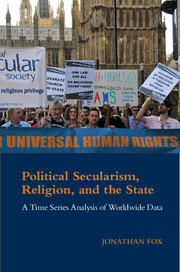Book contents
- Frontmatter
- Contents
- Acknowledgments
- 1 Introduction
- 2 Secularism or Secularization? The Secular-Religious Competition Perspective and Beyond
- 3 Establishment, Support, Neutrality, or Hostility: The Varieties of Official Religion Policy
- 4 State Support for Religion
- 5 Regulation, Restriction, and Control of the Majority Religion or All Religions
- 6 Religious Discrimination
- 7 Education, Abortion, and Proselytizing
- 8 Religion in Constitutions
- 9 Conclusions
- Appendix Data Collection and Reliability
- Bibliography
- Index
4 - State Support for Religion
Published online by Cambridge University Press: 05 May 2015
- Frontmatter
- Contents
- Acknowledgments
- 1 Introduction
- 2 Secularism or Secularization? The Secular-Religious Competition Perspective and Beyond
- 3 Establishment, Support, Neutrality, or Hostility: The Varieties of Official Religion Policy
- 4 State Support for Religion
- 5 Regulation, Restriction, and Control of the Majority Religion or All Religions
- 6 Religious Discrimination
- 7 Education, Abortion, and Proselytizing
- 8 Religion in Constitutions
- 9 Conclusions
- Appendix Data Collection and Reliability
- Bibliography
- Index
Summary
“Do as I say, not as I do” is an old saying often used to describe hypocrisy by the clergy. It also highlights the fact that there is often a significant difference between theory and practice with regard to religion. This distinction is critical in understanding the extent of state support for religion. In the previous chapter, I examined official religion policies of states – whether they have an official religion and, if not, to what extent do they institute a formal regime that privileges some religions or limits all religion. The analysis in this chapter demonstrates that while official religion policy is related to actual levels of support for religion by governments, it is by no means fully determinative.
Unlike a state's overall official religion policy, which changes rarely, change in these more specific laws and policies is common. As described in more detail later in the chapter, 92 (52.0%) of the countries in this study changed their level of support for religion, as opposed to the 21 (11.9%) that changed their official religion policy, making changes in religious support 4.4 times more common than changes in official religion policy. This implies that the tensions between the religious and the secular forces in society described in the secular-religious competition perspective appear to more often cause movement in specific types of government support for religion than in the overall official religion policy. Put differently, a victory in this competition is most likely to be the passing or revocation of a specific law or policy rather than an overall change in the government's formal religious regime.
More important, in this competition, those seeking more state support for religion are having more victories. The analysis in this chapter demonstrates that the contest between political secularism and religious actors described in the competition perspective is active in this policy area. Both sides have had successes, but overall, the religious forces are making significant inroads.
- Type
- Chapter
- Information
- Political Secularism, Religion, and the StateA Time Series Analysis of Worldwide Data, pp. 64 - 104Publisher: Cambridge University PressPrint publication year: 2015

